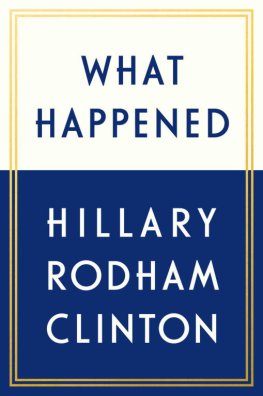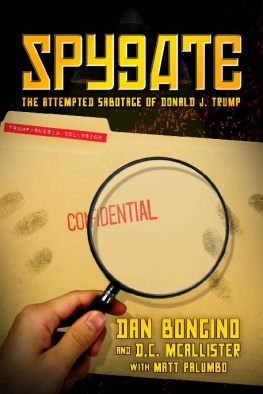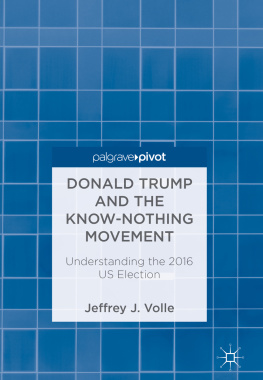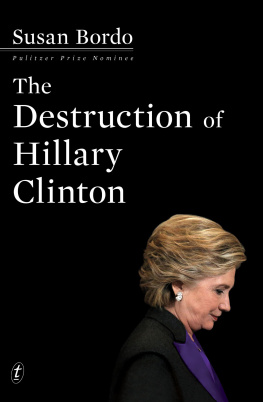An Unprecedented Election
Media, Communication, and the Electorate in the 2016 Campaign
Benjamin R. Warner, Dianne G. Bystrom, Mitchell S. McKinney, and Mary C. Banwart, Editors

Copyright 2018 by ABC-CLIO, LLC
All rights reserved. No part of this publication may be reproduced, stored in a retrieval system, or transmitted, in any form or by any means, electronic, mechanical, photocopying, recording, or otherwise, except for the inclusion of brief quotations in a review, without prior permission in writing from the publisher.
Library of Congress Cataloging in Publication Control Number: 2017047088 (print)
ISBN: 978-1-4408-6065-2 (print)
978-1-4408-6066-9 (ebook)
22 21 20 19 18 1 2 3 4 5
This book is also available as an eBook.
Praeger
An Imprint of ABC-CLIO, LLC
ABC-CLIO, LLC
130 Cremona Drive, P.O. Box 1911
Santa Barbara, California 93116-1911
www.abc-clio.com
This book is printed on acid-free paper 
Manufactured in the United States of America
Contents
Benjamin R. Warner and Dianne G. Bystrom
Natalie Jomini Stroud and Jessica R. Collier
Heesook Choi, Benjamin R. Warner, and Freddie J. Jennings
Esther Thorson, Samuel M. Tham, Weiyue Chen, and Vamsi Kanuri
Kristina Horn Sheeler
Kalyca Becktel and Kaye D. Sweetser
Ashley Muddiman
Daniela V. Dimitrova and Kimberly Nelson
Will Howell and Trevor Parry-Giles
Josh C. Bramlett, Mitchell S. McKinney, and Benjamin R. Warner
Robert C. Rowland
Ryan Neville-Shepard and Meredith Neville-Shepard
Brian Kaylor
Freddie J. Jennings, Calvin R. Coker, Josh C. Bramlett, Joel Lansing Reed, and Joshua P. Bolton
Corey B. Davis
Kelly L. Winfrey and James M. Schnoebelen
Joshua M. Scacco, Kevin Coe, and Delaney Harness
Joel Lansing Reed, Sopheak Hoeun, Josh C. Bramlett, Molly Greenwood, and Grace Hase
R. Lance Holbert, Esul Park, and Nicholas W. Robinson
Kate Kenski
Samantha Hernandez
Michael W. Kearney
Sumana Chattopadhyay
Mary C. Banwart and Michael W. Kearney
INTRODUCTION
Understanding the Unprecedented 2016 Campaign: Two Historical Candidacies Yield an Unexpected Result
Benjamin R. Warner and Dianne G. Bystrom
Four days after the 2016 presidential election, Sam Wang, a professor of neuroscience at Princeton University and publisher of the Princeton Election Consortium site, ate a bug on national television. On November 7, the day before the 2016 U.S. presidential election, Wired published a lengthy article in which they declared that Wang had replaced FiveThirtyEight s Nate Silver as the true election data hero (Nesbit, 2016). How did Wang unseat the reigning king of political prognostication? It was the bold certainty with which he forecast the electionWang declared Hillary Clinton the victor on October 18, more than three weeks before the 2016 election. As explained in the November 7 profile, Wang has been the intrepid election data explorer furthest out this election cycle, never once wavering from his certainty of a Clinton win (Nesbit, 2016, para. 9). When the dust settled on November 8 and Donald Trump was declared the 45th president of the United States, election forecasters were left shaking their heads (Cox & Katz, 2016; Jackson, 2017; Sabato, Kondik, & Skelley, 2016), political scientists found themselves questioning all assumptions (Gelman, 2016), andto make good on a wager he lost when Trump wonWang ate a cricket on CNN (Wang, 2016).
It is therefore quite clear that the results of the 2016 election surprised many. But does the unexpected outcome justify our claim that this election was unprecedented? After all, in 1948, Harry Truman famously beat the polls to defeat Thomas Dewey. In an article titled Clinton-Trump probably wont be the next Dewey defeats Truman, Harry Enten (2016) makes the case that 2016 was in fact unique. As Enten explained, whereas the numbers used to predict Clintons win were drawn from hundreds of polls conducted by dozens of pollsters, only four pollsters were infrequently tracking the race in 1948. Furthermore, pollsters in 1948 used considerably less sophisticated sampling methodologies. In addition, expectations in 1948 were not aided by statistical election forecast models. Wangs model projected a greater than 99% chance that Clinton would win (Wang, 2016). The Huffington Post model was only moderately less confident, assigning a 98% probability to a Clinton victory (Jackson, 2017). The most cautious, the model at FiveThirtyEight , gave Clinton a 71% chance of winning (Silver, 2016). Still, in 1948, as in 2016, many overly confident forecasters and pundits would have been wise to attend to the narrowing of the polls. FiveThirtyEight s final election forecast had Clinton winning the popular vote by 3.6% (Silver, 2016), down from almost double that number in October (Enten, 2016). Clinton ended up winning the popular vote by 2.1%, making the polling miss five times lower than in 1948 and comparable to the polling miss in 2012 (Clement, 2017). So although the national polls were more accurate in 2016 when compared to 1948, the outcome was arguably more unexpected.
Ultimately, however, our claim that the 2016 election was unprecedented has far more to do with the two major-party candidates and their campaigns than with the surprise outcome. The case that Clinton was an unprecedented candidate is somewhat self-evident. She became the first woman to ever be nominated by a major political party to head its ticket. Her defeat ensured the continuation of the more-than-200-year monopoly men have held on the presidencya streak rooted in numerous social and structural inequalities (Watson & Gordon, 2003). Furthermore, in her bid to become the first woman elected president, Clinton faced unprecedented challenges. Three of these challenges, in particular, are worthy of extended consideration: one, that her campaign was targeted by a hostile foreign rival in a bid to undermine confidence in U.S. democracy; two, that she was the focus of an FBI investigation that became unusually public; and three, that a scandal regarding her handling of e-mails dominated media coverage of her candidacy.
Russian interference in democratic elections is a growing element of their strategic foreign policy (Paul & Matthews, 2016). Russia has intervened in elections in Ukraine, Bulgaria, Estonia, Germany, France, Australia, and the United States (Dorell, 2017). To do this, they employ upwards of 1,000 people tasked with spreading and amplifying misinformation and conspiracies through various online platforms (Paul & Matthews, 2016). In the 2016 election, this army of online trolls was utilized to push false news stories and conspiracies about Clinton in key battleground states such as Michigan, Wisconsin, and Pennsylvania (Roberts, 2017). Independent researchers estimate that this strategy resulted in disinformation about Clinton being viewed more than 213 million times (Timberg, 2016). The efforts of this propaganda campaign were primarily directed at portraying Clinton as a criminal who was hiding a potentially fatal illness (Timberg, 2016). This misinformation campaign was only part of Russias interference in the election. Russia was also responsible for hacking into e-mail accounts that granted them access to communications from the Democratic National Committee (DNC) and high-level Clinton staffers (Fisher, 2017). To emphasize how unprecedented Russias interference was in the 2016 election, it is worth quoting former FBI director James Comey in his testimony before the U.S. Senate Intelligence Committee:
Next page






